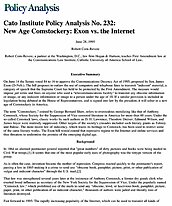On June 14 the Senate voted 84 to 16 to approve the Communications Decency Act of 1995, proposed by Sen. James Exon (D‑Neb.). The bill proposes to outlaw the use of computers and telephone lines to transmit “indecent” material, a category of speech that the Supreme Court has held to be protected by the First Amendment. The measure would impose jail terms and fines on anyone who used a “telecommunications facility” to transmit any obscene information or image, or any indecent information or image to a person under the age of 18. If a similar provision is included in legislation being debated in the House of Representatives, and is signed into law by the president, it will usher in a new age of Comstockery in America.
The term “Comstockery,” coined by George Bernard Shaw, refers to overzealous moralizing like that of Anthony Comstock, whose Society for the Suppression of Vice censored literature in America for more than 60 years. Under the so called Comstock laws, classic works by such authors as D. H. Lawrence, Theodore Dreiser, Edmund Wilson, and James Joyce were routinely suppressed. Other targets of the society’s crusades included such literary giants as Tolstoy and Balzac. The more recent law of indecency, which traces its heritage to Comstock, has been used to restrict some of the same literary works. The Exon bill would extend that repressive regime to the Internet and online services and thus threatens to undermine the promise of the emerging digital age.

This work is licensed under a Creative Commons Attribution-NonCommercial-ShareAlike 4.0 International License.

